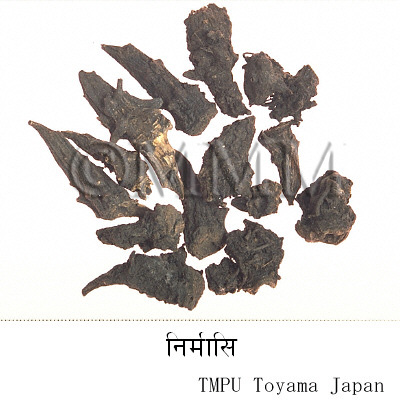資料館生薬データベース
※画像をクリックすると、拡大して表示されます。
生薬名 | 入手時名称 | Nirmasi |
|---|---|---|
| 正式名称 | Vatsanabha | |
別名 Tips! | Mohri (H) | |
| 英語名 | Indian Napellus | |
| 原植物名 | Aconitum chasmanthum Stapf ex Holmes, Indian Napellus | |
| 原植物科名 | Ranunculaceae, キンポウゲ科 | |
| 薬用部位 | 分類 | 植物性生薬 | 細分類 | 根 |
| 入手先情報 | ネパール王国, カトマンズ | |
| 入手年月日 | 1991/04/13 | |
| 蒐集者 | 難波恒雄, 他 | |
| TMPW No | 14799 | |
首都、省都または行政区域代表地点(都道府県庁所在地など)を表示しています。
産地情報
https://ethmed.toyama-wakan.net/img/pin_san.png
27.7172453
85.3239605
入手先情報
ネパール王国,カトマンズ
https://ethmed.toyama-wakan.net/img/pin_nyu.png
学術情報データベース
| 生薬名 | 一般生薬名 (アーユルヴェーダ名又は サンスクリット名), 英語名 | Vatsanabha (A. chasmanthum), Indian Napellus | ||
|---|---|---|---|---|
| 異名 | Amrta, Vajraranga, Vatsanagaka, Visa, Sthavaravisa. | |||
| 生薬画像 |
| |||
| 原植物名 | Aconitum chasmanthum Stapf ex Holmes | |||
| 原植物科名 | Ranunculaceae, キンポウゲ科 | |||
| 薬用部位 | Roots | |||
| 分布地域 | An erect, perennial herb found in the sub-alpine and alpine western Himalayas between altitudes of 2100m and 3600 m; also found in the mountains of Assam and in the sub-alpine grasslands of Himachal Pradesh. | |||
| 一般応用 | Vatsanabha is a virulent poison but when mitigated, it works as alternative antiinflammatory, diaphoretic, expectorant, stomachic and nervine tonic. It is employed in large number of drug formulations prescribed for the cure of asthma, diabetes, loss of appetite, paralysis, rheumatic arthritis, typhoid and nasal catarrah. | |||
| 成分情報 | アルカロイド Alkaloids 14-O-Benzoyl-8-methoxybikhaconine[(1alpha,6alpha,14alpha,16beta)-20-ethyl-13-hydroxy-1,6,8,16-tetramethoxy-4-methoxymethylaconitan-14-yl benzoate] (*C1), 14-O-Benzoyl-8-ethoxybikhaconine [(1alpha,6alpha,14alpha,16beta)-8-ethoxy-20-ethyl-13-hydroxy-1,6,16-trimethoxy-4-methoxymethylaconitan-14-yl benzoate] (*C1), Chasmanthinine (*C2), Indaconitine hemiactonitrile solvate (*C3) その他 Others The alkaloid content of the roots ranges from 2.98 to 3.11 per cent. The following alkaloids have been isolated: indaconitine, chasmaconitine, chasmanthinine, chasmanine and homochasmanine. | |||
| 医学体系 | アーユルヴェーダ | |||
| 方剤 | Mrtunjaya rasa, Hingulesvara rasa, Agnitundi vati, Sanjivani vati, Kaphaketu, Ananda bhairava, Jvaramurari, Tribhuvan kirti rasa and Laghu visa garva taila. | |||
| 同類生薬 | This species is very similar to A. napellus, for which it has often been mistaken. A. chasmanthum has the same uses as A. napellus (= A. ferox). | |||
| コメント | In some books, this species is also considered as Vatsanabha. | |||
| 参考文献 | 参考図書 Tips! | Illustrated Manual of Herbal Drugs Used in Ayurveda, 1996. Sarin, Y.K., Council of Scientific & Industrial Research and Indian Council of Medical Research, New Delhi p 112. Plants in Ayurveda (A Compendium of Botanical and Sanskrit Names), 1997. Abdul Kareem, M., Foundation for Revitalisation of Local Health Traditions, Bangalore 3. | ||
| 研究論文一覧 | *C1 Parvez, M., Gul, W. and Anwar, S.; Acta Crystallogr., Sect. C: Cryst. Struct. Commun., C54, 790-92 (1998). *C2 Parvez, M., Gul, W., Anwar, S., Miana, G. A., Atra-Ur-Rahman and Choudhry, M. I.; Acta Crystallogr., Sect. C: Cryst. Struct. Commun., C55, 70-72 (1999). | |||
| 備考 | Of the Acontinum spp. occurring in India, the roots of nine species are commonly found in the Indian markets. Chemical analysis of the market samples, obtained from various places, has shown that the aconite sold in Indian markets (commonly referred to as Acontinum ferox) is not a single species, but a mixture of three or four species with their alkaloid contents varying from 0.63 to 4.7 per cent. The material coming from Nepal consists of root of A. falconeri Stapf or a mixture of A. falconeri, A. laciniatum Stapf and A. ferox Wall. and A. spicatum Stapf. | |||
| 更新日 | 2024/04/09 | |||

